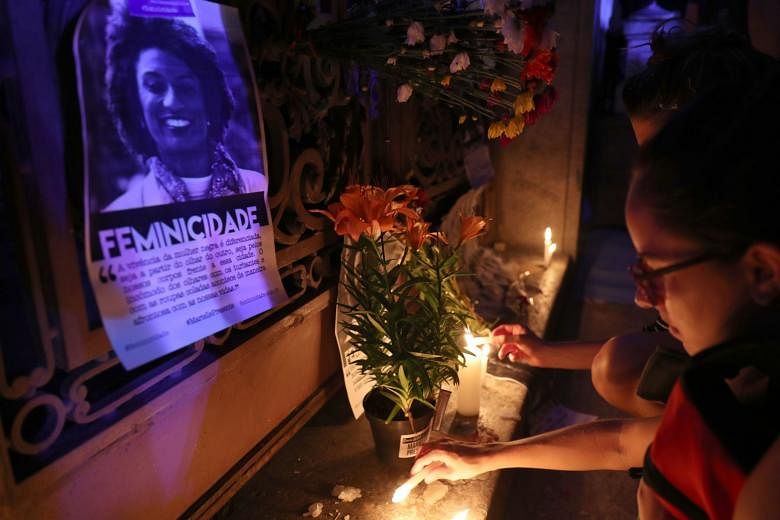RIO DE JANEIRO (BLOOMBERG, AFP) - Brazilians are reacting with outrage to the murder of a prominent councilwoman and human rights activist in Rio de Janeiro, in a blow to President Michel Temer's decision to deploy the military to tackle criminality in the postcard city.
Ms Marielle Franco, a 38-year-old black politician from one of Rio's poorest and most violent communities, was returning home from an event in the city centre late on Wednesday (March 14) when a car pulled alongside hers and opened fire, local media reported.
Ms Franco's driver was also killed, but an aide travelling with her survived.
The killing had the hallmarks of an assassination. Police say her car may have been tailed several miles before the killer fired and then disappeared.
No suspects have been announced by police, but Ms Franco, who was 38, had ruffled many feathers - and that was her mission.
Before being gunned down, Ms Franco built a career standing up for the many others living in danger of bullets and abuse.
Black, lesbian and unusually vocal in castigating alleged killings by out-of-control police units in Rio's impoverished favelas, she had no interest in keeping a low profile.
In city council elections in 2016 she surprised everyone, including herself, by getting 46,000 votes, the fifth biggest tally of anyone running. The victory thrust her into a world dominated by white men.
"This is certainly an attack on the rule of law and an attack on democracy," Mr Temer said in a video published on social media. He delayed a previously-scheduled event at the presidential palace to hold a Cabinet meeting on Rio's security, and said the federal police was willing to help with the investigations.
Ms Franco's violent death underscores challenges in reducing bloodshed in Brazilian cities, many of which rank among the most violent in the world. Violence is particularly intense in Rio de Janeiro, where criminals frequently clash with police forces, causing the shutdown of major motorways and disrupting the local economy.
Mr Temer last month (February) ordered the military to take over Rio's security, and public order has become a central theme ahead of this October's presidential election.
Thousands gathered to watch Ms Franco's coffin enter the state assembly building in downtown Rio on Thursday afternoon, with local media providing blanket coverage of the cortege. As night fell, huge crowds marched in central Rio and Sao Paulo in protest at her murder.
Public figures from across Brazil's political spectrum expressed outrage over her murder. Finance Minister Henrique Meirelles, who is contemplating a bid for the presidency, said the assassination underscores the need of the Rio military operation.
"Those who did this need to be punished," Mr Meirelles said during a radio interview.
Members of her family and her party were unaware of any threats against her life, according to local media.
Born in a favela and active in black rights movements, it was not surprising that Ms Franco's last act before getting in the fateful car had been to participate in a debate on black empowerment in the trendy Lapa neighbourhood.
"Marielle was smiling, strong, sure of herself and kept her feet on the ground," said Ms Marcela Lisboa, a former fellow activist in the leftist Socialism and Liberty Party (PSOL). "She looked at other people in the eyes and knew she was different to the other politicians."
Ms Franco's background in the huge Mare favela, one of the most violent places in Rio, informed her approach. For years, the Mare has been wracked by wars between narco-trafficking gangs and often heavy handed interventions by police.
Ms Franco said her political life began when she had just signed up for university on a special programme for youths from favelas when her friend, also a student, was hit by a stray bullet.
Although she got pregnant at 18, she continued to take night classes and eventually got a scholarship to study at the prestigious PUC college, studying sociology there and later public administration.
In 2006 she became an assistant to Rio state deputy Marcelo Freixo, from the PSOL, who headed a trailblazing committee looking into the activity of shadowy - and much feared - militia groups that run mafia-like rackets in favelas.
When she was elected to the city council, Ms Franco stood out for a bill that would force the city to track statistics on violence against women.
She had also sharply criticised Mr Temer's decision to put the army in charge of Rio's failing security services. Two weeks ago, she was name to coordinate a committee meant to look out for military abuses.

